Introduction To Luke’s Gospel
Would you like to understand Luke’s Gospel in a clear and in-depth way? This article will give you an introduction to the Gospel of Luke. And give you a foundation, to easily follow this series through Luke’s Gospel.
If you have struggled reading your Bible, this series will help you greatly.
Your Faith Rekindled By Reading Luke’s Gospel
If you’ve questioned your faith, today’s article is going to be very beneficial to you.
I almost didn’t do this introductory post. But I feel like I was supposed to begin this series a long time ago.
But I was getting in my own way.
One of the helpful motivators to start was paying attention to the types of messages I get on a regular basis. Those messages tell me, you know what, you’re doing so much good for people. Keep going!
It was comments from people like you, reading this today, which motivated me to continue and to start doing things even more. This is going to be a powerful post. I know God wants me to do this.
This is going to be a powerful post. I know God wants me to do this.
Here is a comment I received from somebody saying they love the sermon I posted on my YouTube channel recently. It was so inspiring and I promise you today’s post is going to be even more inspiring.
Another comment I saw recently was somebody telling me one of the videos I produced was awesome.
I hope today’s article is even more awesome, and I can show you God’s awesome power through these scriptures.
Luke’s Gospel (Using The 7P’s Roadmap)
In this post, we are going to go through what I’m calling the 7Ps roadmap.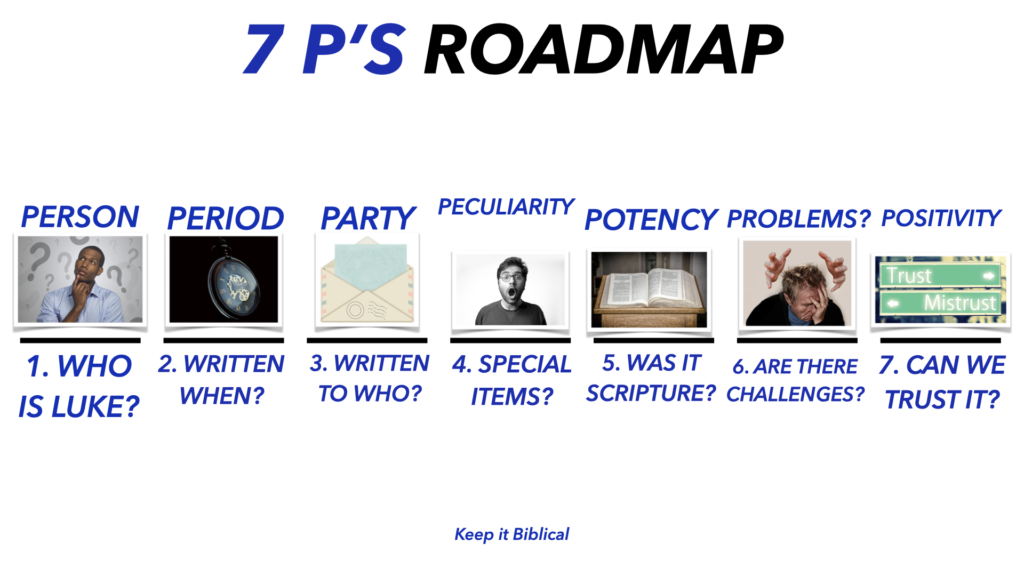
I’ll walk you through the seven steps to build the foundation right for this Gospel of Luke series.
The First P is the Person. We’re going to look at who Luke actually is. Who is Luke from a scriptural perspective? What does the Bible tell us about Luke? What does history tell us about who Luke is?
We’re going to look at who Luke actually is. Who is Luke from a scriptural perspective? What does the Bible tell us about Luke? What does history tell us about who Luke is?
The Second P is the Period. What time period was Luke writing his Gospel account? Was the time of writing this account right, to make it an authentic book to read? Was he writing in the right period of time?
What time period was Luke writing his Gospel account? Was the time of writing this account right, to make it an authentic book to read? Was he writing in the right period of time?
The Third P is the Party.  Who was Luke actually writing his book to?
Who was Luke actually writing his book to?
Once we understand who Luke was writing to, it helps readers today learn, and discover how it impacts us personally. We can then apply what we’re reading in his Gospel account, in the right way, to our day-to-day lives.
The Fourth P is Peculiarity. What are the special things we find in Luke’s gospel account which are not found in the other three Gospels?
What are the special things we find in Luke’s gospel account which are not found in the other three Gospels?
The Fifth P is Potency. Was Luke writing scripture? Or was he just writing a good book from history we can read and get insights about Jesus from?
Was Luke writing scripture? Or was he just writing a good book from history we can read and get insights about Jesus from?
In current times, it’s not a surprise to find atheists, or people from other religions saying the Bible isn’t inspired.
We’re going to look at an example today, where this sort of messaging is coming from people even inside the church!
The Sixth P is Potential Problems with the Gospel. There are, obviously, always going to be people who challenge the Gospel and the Bible.
There are, obviously, always going to be people who challenge the Gospel and the Bible.
The sixth pillar will deal with the potential problems.
The Seventh P is Positivity. Can we actually trust it? Was it Luke who was writing this? Can we trust it was from Luke, and not from somebody else writing a false Gospel?
Can we actually trust it? Was it Luke who was writing this? Can we trust it was from Luke, and not from somebody else writing a false Gospel?
We will keep coming back to these seven pillars as we go through this Gospel of Luke series. They will form the backdrop for the topics we will cover specifically in this series.
Pillar 1: Who Was Luke?
Who on earth was Luke?
When we come to Luke’s Gospel account, we have that question in mind, right?
Who is this person that’s actually writing this passage?
What does the scripture teach us about Luke?
The first point I want to point out is that Luke, according to scripture, was a doctor.
He was classified as the beloved physician.
Read Colossians 4:14 where Paul is signing off. And he’s saying Luke is the beloved physician. He’s the beloved doctor. So we know from the scriptures Luke was a doctor of some kind.
Further, we also know Luke was that one ride or die guy, Paul knew he could count on.
How do we know this? Because in 2nd Timothy 4:11, we see Paul say everybody has deserted him but Luke. He was the only one who stuck it out, and stayed by his side.
If you are reading this, you most likely have somebody like that in your life. If you haven’t already realized, that person is Christ at a bare minimum. Let alone if you start talking about human individuals.
Luke was also someone who was a co-labourer in the Gospel. He went about preaching the Gospel alongside people like Paul the apostle.
Evidence of that is in Philemon 1: 24. This describes Luke as a co-labourer in the Gospel. Where Paul was going, Luke was travelling and preaching with him.
Another thing we see from scripture is Luke traveled around with apostles. If you look at passages like Acts 16: 8-10, and other places towards the end of Acts, we see descriptions of Paul’s travel journeys with words like “we”.
If you look at passages like Acts 16: 8-10, and other places towards the end of Acts, we see descriptions of Paul’s travel journeys with words like “we”.
Luke also spoke with eyewitnesses. We get insight by looking at the first couple of lines in his Gospel account.
He spoke with eyewitnesses, and received insights about things he shared.
These are some things scripture reveals to us about who Luke was.
Now, let’s look at who Luke was, according to history.
Before we continue, allow me to share this.
Protestants have a bad rap. People say protestants don’t understand, or don’t care about history. That is not the case. We are just like anybody else who looks at history. We look at history, but don’t treat all history concerning Jesus as Gospel truth.
So I’m about to show you things based on historical information, which is outside of the scripture. We can analyse and compare it to some of the things I just showed you.
The Anti-Marcionite Prologue Firstly, this document is called the Anti-Marcionite prologue. [1]Anti-Marcionite Prologue
Firstly, this document is called the Anti-Marcionite prologue. [1]Anti-Marcionite Prologue
What we’re about to read pretty much amplifies things I’ve just shown you in the scriptures.
The Anti-Marcionite Prologue was written about 140 years after the crucifixion. It says, “indeed Luke was an Antiochian Syrian, a doctor by profession, and a disciple of the apostles.“
It further says, “he never had a wife, he never fathered children, and he died at the age of 84, full of the Holy Spirit in Boetia which is Greece.“
The Bible doesn’t tell us Luke never had a wife, or children, or he died at the age of 84. This is why I refer to this as the amp, or the amplified version.
Note: Don’t handle it as scripture! But it’s giving us some potential truthful insights about Luke.
The reason I highlighted this particular example, is because it talks about how Luke was a gentile. You can argue this from scripture as well, when you look at passages like Colossians 4 in a little more detail.
This showcases to you, Luke is in very rare air-space. A likely gentile…Who’s able to write scripture! You don’t often find that in the Biblical text.
Here is another example I thought was significant. I’m going to bring this out again in the next article, because this is from the book of Daniel.
Daniel 4: is by king Nebuchadnezzar. A gentile Babylonian, who is writing to all people.
This is a first person account of things that seem good to him. He shares what God has done to/for him.
And I’ll bring this up in the next article, because it’s very beneficial.
The Muratorian Canon
The next example from history is called the Muratorian Canon. [2]Muratorian Canon
In order for you to remember this, I’m just going to say the MC. What an emcee does is control the microphone, right?
I put together this little rhyme to help you remember…
Hey everybody it’s the MC, listing books that the Christians hold dearly, It was written about 170AD. By the way, if you didn’t know I used to be an emcee.
We’re now going to look at professing Christians from around the same time period (170AD). We’re going to look at somebody like Irenaeus.
Irenaeus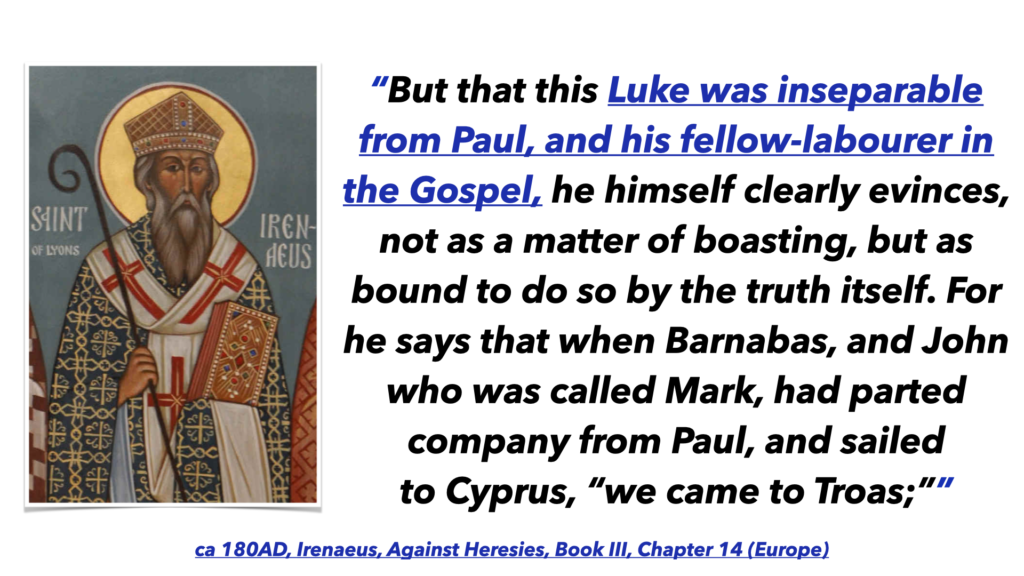
I haven’t got any raps for him. But notice what he says. “Luke was inseparable from Paul and his fellow labourers in the Gospel.” [3]Irenaeus. Against Heresies. Book III. Chapter 14
Sounds very familiar to what I mentioned from passages like Philemon, etc. Irenaeus was from Europe, just for the record.
Tertulian
Another example (about the same period in time) is by African theologian Tertulian [4]Tertulian. Against Marcion. Book IV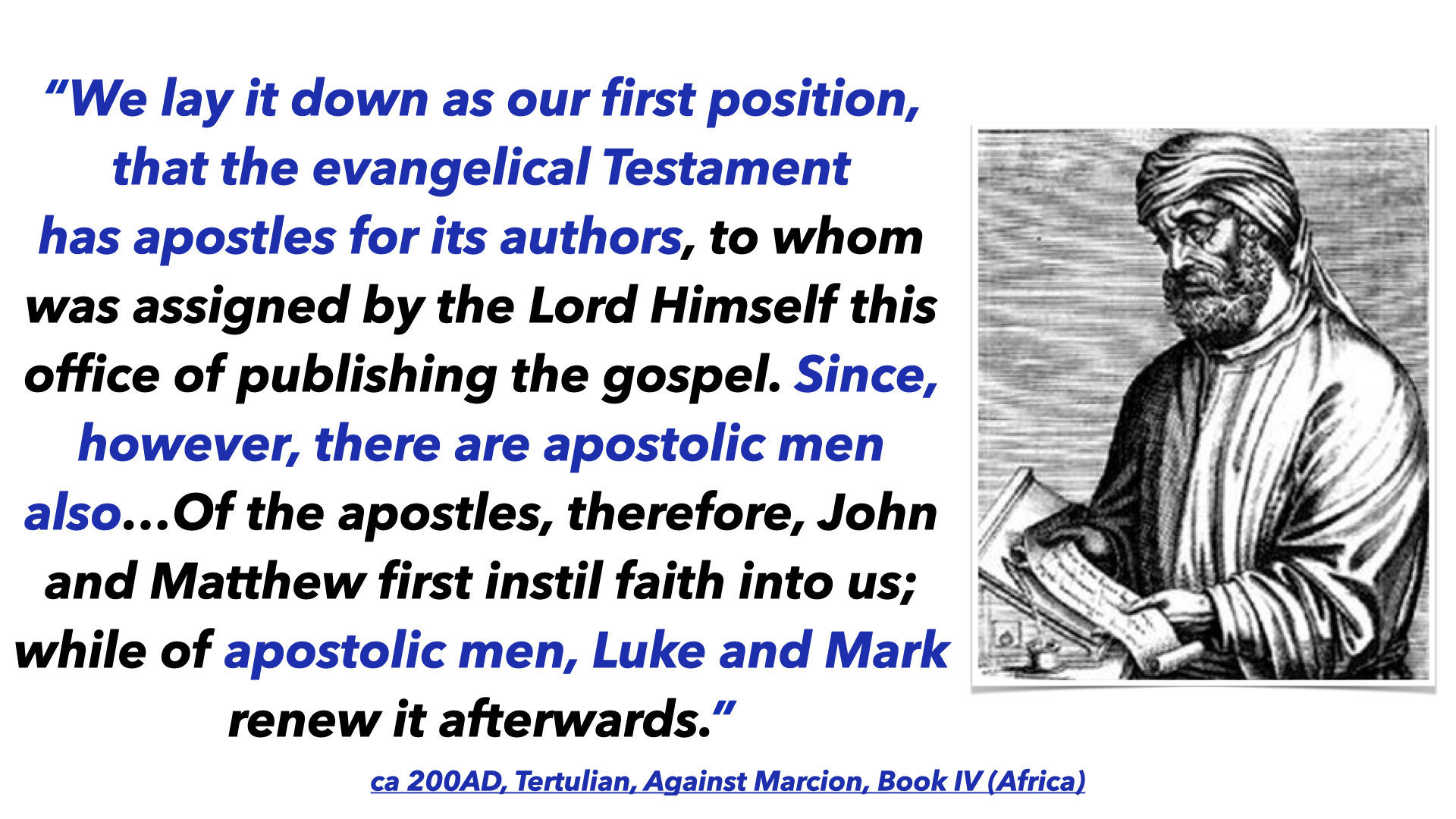 He says, “we lay it down as our first position that the evangelical testament has apostles for its authors.“
He says, “we lay it down as our first position that the evangelical testament has apostles for its authors.“
Then it goes on to say but there’s also “apostolic men” and he mentions “Luke and Mark“.
Many people don’t know, Matthew was one of the 12 disciples.
John who wrote his Gospel account, was one of the 12 disciples.
But Mark and Luke were not among the 12 disciples.
This is why people like Tertulian were calling them apostolic men not apostles.
Here’s a recap: The first pillar – the person
Who is Luke?
We’ve seen Luke is a doctor.
He traveled with the apostles and spoke with eyewitnesses.
Further, he was likely a gentile.
Pillar 2: The Period
Was Luke writing in the first century, which would be very beneficial to us?
Or was he writing in another time period? This would render Luke’s writing obsolete!
Good Evidence Luke’s Gospel Was Written In The 1st Century
Luke was written before the book of Acts, because Luke wrote both of the books. You can build a strong case Acts is a 1st century work. Therefore Luke is a 1st Century work. I will not develop this now. But this is a strong argument for Luke’s 1st century dating.
 Key Deaths
Key Deaths
So far, another thing which is significant is Luke did NOT mention key deaths in the early church.
For example, in his Gospel account, he mentions the death of Jesus, which is clearly significant to us as Christians.
He also mentions the death of people like Stephen in his second book, Acts (Acts 7:55-60). He also mentions the death of James the brother of John (Acts 12:1-2).
But he doesn’t mention the likes of Peter, Paul or James, the brother of the Lord. History suggests they all had died by the mid 60s. So, if he’s not mentioning those key deaths, but he’s mentioning the deaths of other disciples and key figures, why would he not mention them?
So, if he’s not mentioning those key deaths, but he’s mentioning the deaths of other disciples and key figures, why would he not mention them?
Was it because he thought they were not important?
Why mention the other deaths?
Was it because he decided not to mention them? It’s possible.
But weighing the evidence, it seems best to conclude, those deaths had not occurred, by the time he was writing the book of Acts!
Can you see how this is pushing things closer into the first century? This gives it more potential to be an authentic document.
Temple Destruction
Another thing left out from Luke’s Gospel, and Acts, is the destruction of Jerusalem’s temple in 70AD. He doesn’t mention the destruction of the temple, even though he mentions Jesus predicting the temple would be destroyed. We know this happened about 70 AD (about 30-40 years after Christ’s crucifixion).
He doesn’t mention the destruction of the temple, even though he mentions Jesus predicting the temple would be destroyed. We know this happened about 70 AD (about 30-40 years after Christ’s crucifixion).
Why didn’t he mention it? We can consider the three options I presented for Luke leaving out key deaths above. The best conclusion is the event had not happened yet.
Another piece of evidence Luke was writing in the right time period was, he describes bodies of water correctly. He describes the places, the trees, the food, and names correctly. A great book to get your feet wet with stuff like this is “Can We Trust The Gospels” by Dr Peter J Williams. [5]Peter J Williams. Can We Trust The Gospels
A great book to get your feet wet with stuff like this is “Can We Trust The Gospels” by Dr Peter J Williams. [5]Peter J Williams. Can We Trust The Gospels
There are so many things described accurately, which leans more towards first century authorship.
Somebody writing later in the first century or in the second century could not capture such details like we may imagine doing today.
Unlike today, where we can use the internet to find places, Luke did not have our luxury! In order to get this information accurate back then, indicates he was there personally, or at the bare minimum, was speaking with people who knew these locations extremely well.
Here are a couple more things I will briefly mention.
Luke’s work is quoted by first century, and early second century documents as scripture. He’s referenced by the likes of the Didache [6]Didache. Ch 4. 13, or Justin Martyr [7]Dialogue With Trypho. Ch 100. 103.
He’s referenced by the likes of the Didache [6]Didache. Ch 4. 13, or Justin Martyr [7]Dialogue With Trypho. Ch 100. 103.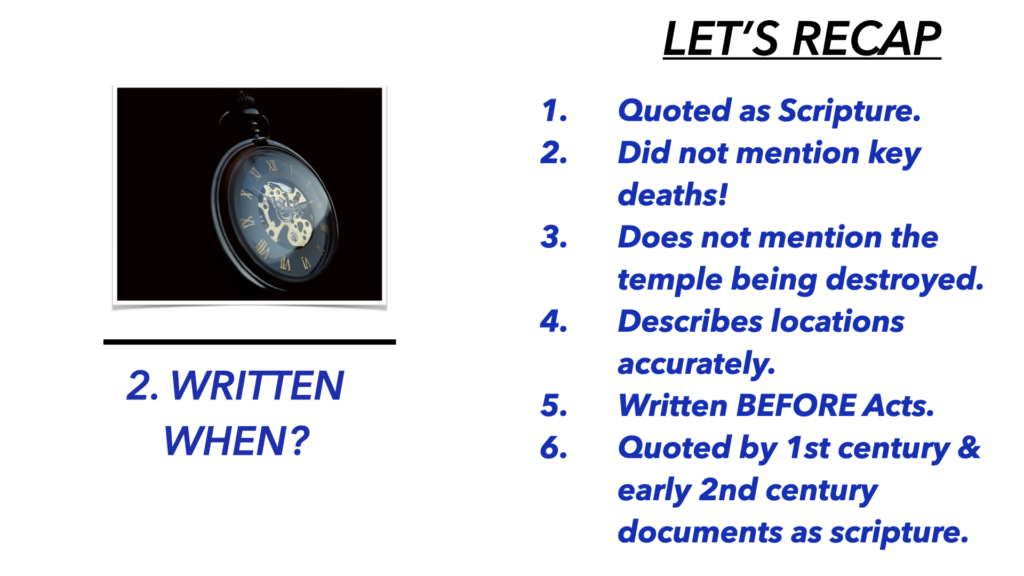 Pillar 3: Party
Pillar 3: Party
Who was Luke writing to when he decided to pen his Gospel?
Luke tells us, when you read his first 4 verses. We will cover this in the next session. He references a man, (or somebody) by the name of Theophilus.
Theophilus just means a friend or a lover of God.
Some people take this and say Luke is just writing to any friend or lover of God.
That would include people like me, you, and those reading this post, trying to learn more about the scriptures and go deeper.
We are Theophilus, so to speak. That’s how some people render this.
Was It Really Written In The First Century?
Obviously, there will be naysayers all the time. Some people will say Luke wasn’t written in the first century.
They choose to ignore everything I’ve covered so far. Or explain it away with less reasonable (and plausible) argumentation.
One such argument is…Theophilus was a bishop in the second century.
THIS IS WHO LUKE WAS WRITING TO!
The problem is, we can use that logic and reverse it. There were multiple people named Theophilus in the first century. Therefore, Luke was writing to this Theophilus. When you can switch the argument, and it’s just as powerful, it doesn’t really hold much weight. But there’s more.
From Luke’s writings, it is clear to me his writings were done in the first century. If there’s a high priest called Theophilus, or more than one, some people say Luke could have been writing to somebody like him.
Luke shows an interest in the priestly role, in the early part of his Gospel account.
Could this be because he was writing to a high priest, who obviously appreciated this background context? As much as I personally like the previous high priest argument, I believe this next argument is the strongest.
As much as I personally like the previous high priest argument, I believe this next argument is the strongest.
Was Luke writing to a Roman official? Luke calls Theophilus most excellent Theophilus. And when we look at Luke’s two books, he only classifies roman officials as the most excellent.
There are several arguments about who Luke was writing to, and the potential deliberate ambiguity Luke may have created (I will mention potential ambiguity Luke may create in pt. 4 of this series).
The important thing is…Luke identifies why he’s actually writing – to strengthen the faith already believed, by the person (or the people) he was writing to.
The Gospel Is For Everyone

Luke tells us, his Gospel is for all of us: Israelite & Gentile. What Christ did is for everybody who believes.
What if Theophilus isn’t every friend or lover of God? How can Luke be writing scripture if he was writing to a high priest, some other Israelite, a Roman official, or just someone in leadership?
In the book of Colossians, at the end of Paul’s epistle, he says this epistle is read among you, and it should be read also in the church of the Laodiceans (Colossians 4:16).
So, Paul is saying he’s writing to the church of Colosse. And they should share it with the Laodiceans, which was a neighbouring church.
If Luke was writing to one individual Theophilus, that isn’t a reason to say it’s not scripture, or it doesn’t apply to us all.
The Gospel was worldwide, and even if it was written to one person or group, it could still be shared with other people.
Pillar 4: Peculiarities
Why is Luke’s Gospel account so special?
It shares with us Jesus’ first words! Luke 2:49 reads:
Luke 2:49 reads:
“and he said unto them, how is it that you sought me. Why are you looking for me? because they had lost Jesus. Didn’t you know that I must be about my father’s business?”
There’s so much packed into those first words! I look forward to covering it later in the series by God’s grace. This is the earliest genuine account we have, of things Jesus said.
He was 12 years old.
The only thing we have that Jesus said from before he was 15 years old.
Luke’s Gospel account has some of the greatest parables like the good Samaritan, the rich man and Lazarus, the prodigal son, the widow woman, or the two men that went up to the temple to pray.
 Luke’s Gospel has some of the most relatable parables Jesus taught. He shares those with us, which I think is actually quite powerful.
Luke’s Gospel has some of the most relatable parables Jesus taught. He shares those with us, which I think is actually quite powerful.
Another peculiarity for Luke’s Gospel is the high level Greek. If you don’t know Greek, or if you’re not studying these kinds of things, you won’t even know.
Luke starts his Gospel account in a very similar way to one of the most famous people in regards to health and medicine – Hippocrates. [8]Dr R. J. Knowling. The Medical Language of St. Luke. II. The Biblical World Vol 20. No 5 (Nov 1902). 370-379 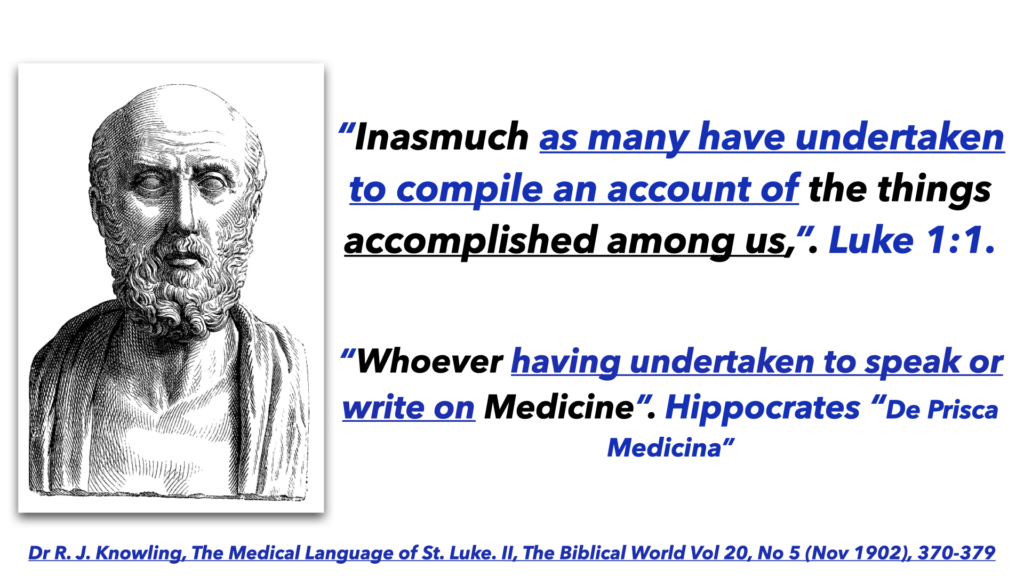
There are so many of these. Only Luke does these kind of things in the New Testament. These writing techniques tend to push Luke more into the favour of being an educated man (i.e a doctor).
It’s not just because he’s using these kinds of words. Other people use similar words too. But Luke uses these words frequently which showcases he’s educated.
A doctor obviously would be educated. At the same time, nobody else in the New Testament is actually doing this, which is powerful.
To help you understand this point better, compare how John starts his Gospel with Genesis.
He starts with God creating, and he gives us a deeper revelation about who God actually is (John 1:1-3).
Luke had this special sign, as John had. A special sign which people who are in the know would obviously pick up on.
Luke is being used to showcase his peculiarities by the power of the Holy Spirit.
Destroys Cults In Luke’s Gospel
Another peculiarity about Luke’s Gospel account is it destroys false cults and false groups in multiple different ways. For instance, those who did not like the fact Jesus physically rose from the dead. Luke’s Gospel account obliterates this false position. Luke’s Gospel account takes down several false religions and false ideologies.
For instance, those who did not like the fact Jesus physically rose from the dead. Luke’s Gospel account obliterates this false position. Luke’s Gospel account takes down several false religions and false ideologies. Pillar 5: Potency
Pillar 5: Potency
Is Luke writing scripture, or is he just writing a historical book which has no additional value? As Christians, we believe in the highest potency of what Luke was writing.
As Christians, we believe in the highest potency of what Luke was writing.
There is this clip of a pastor (Pastor Andy Stanley) telling his congregation Luke is not writing the Bible. Luke didn’t have any idea there would ever be the Bible.
A pastor in a church is telling his congregation, when Luke was writing what we call the Gospel account today, it wasn’t potent. It really wasn’t scripture. He didn’t even have any idea he was writing scripture. He didn’t know about the Bible, which would include New Testament writings like Luke’s Gospel account.
Is Luke’s Gospel Quoted As Scripture?
When Paul speaks about communion in 1st Corinthians, he says he’s received this from the Lord and is delivering it to you.
What is actually potent is, when he’s talking about this is my body which is for you. Do this in remembrance of me, in regards to the bread and the wine. That has its closest connection to Luke 19:20-21.
1 Corinthians was said to be written about mid-50s AD, about 20 years after Christ. If Luke is being quoted here, this implies Luke was written before the mid 50s, right?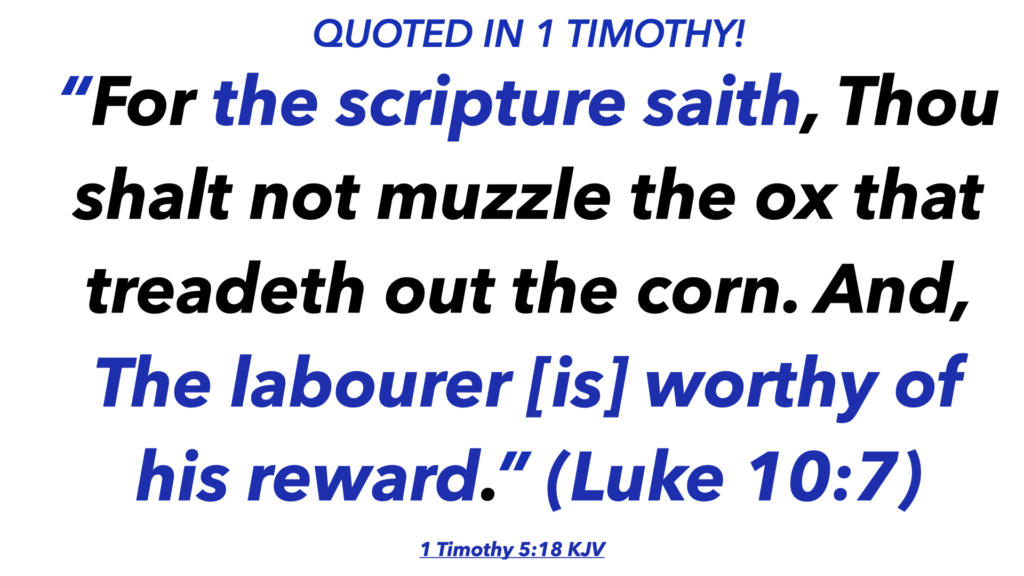 Clearly more significantly though, in 1st Timothy 5:18. Paul quotes scripture and says, you shall not muzzle the ox that treads out the corn. That is a reference to Deuteronomy 25.
Clearly more significantly though, in 1st Timothy 5:18. Paul quotes scripture and says, you shall not muzzle the ox that treads out the corn. That is a reference to Deuteronomy 25.
Then he says…the labourer [is] worthy of his reward. This is in Luke 10:7.
Paul is equating Deuteronomy with Luke’s Gospel account! This was written in the early to mid 60s!
So, if Luke is written before 1st Timothy, that obviously implies Luke was written before 1 Timothy was in the 60s doesn’t it?
If the crucifixion is 30 to 33 AD, and Paul wrote 1st Corinthians in mid 50s.
Then wrote 1st Timothy in the early to mid 60s.
He then dies mid 60s (around 65 AD).
This means Luke was written before this.
Let me show a visual timeline of this to help you understand. We can slot Luke’s Gospel account into this window. He’s Gospel couldn’t have been written any later than around 65 AD.
We can slot Luke’s Gospel account into this window. He’s Gospel couldn’t have been written any later than around 65 AD.
This obviously hinges on Pauline authorship of 1 & 2 Timothy (Which a majority of scholars deny). I believe the case is strong, but will not spend further time developing it here.
This is pivotal and I’ll show you why now…
Remember how I said Paul described Luke in 2nd Timothy as the one ride or die friend? Paul quoted Luke as scripture in 1 Timothy!
Do you think Luke traveled around with Paul (still by the time of 2nd Timothy) and did not know he was writing scripture?
He would be obviously writing about something which is actually genuine and true.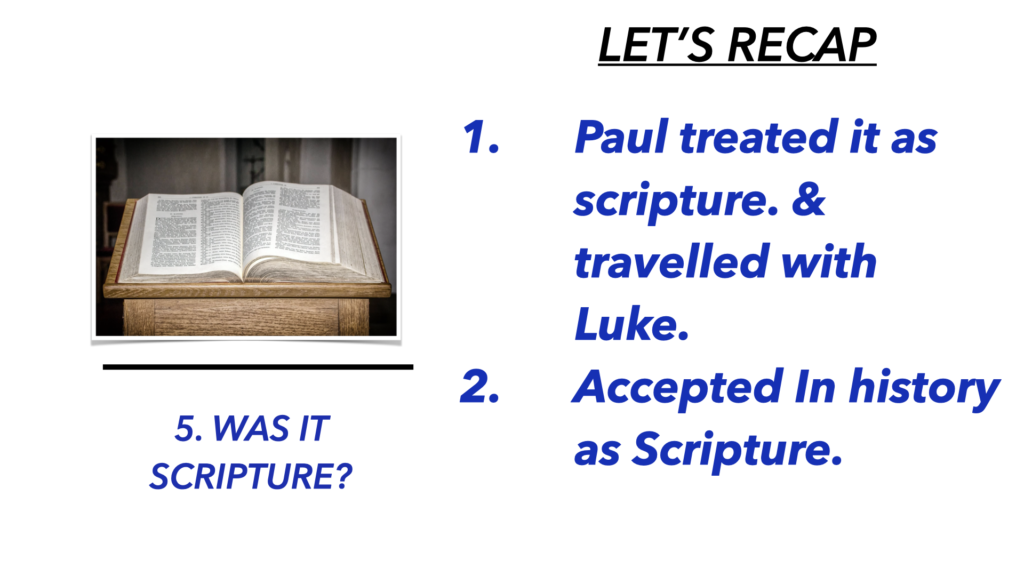 Pillar 6: Potential Problems
Pillar 6: Potential Problems
One of the biggest challengers to Christianity in the last 20 years is Dr. Bart Erhman.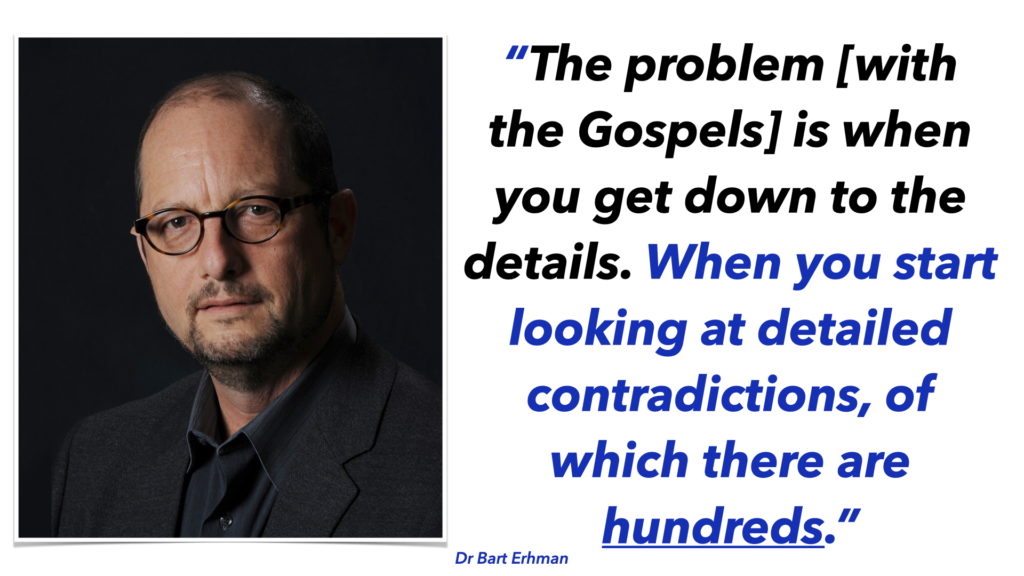

For example, the two family trees of Jesus Christ: in Matthew 1 and Luke 3. Why are they different? Is Luke just wrong?
Luke says he spoke to eyewitnesses. He studied this out. We believe as Christians that he’s led by the Spirit. But did he just get things wrong? Did he get his places wrong?
When we get to Luke 2, the decree by Caesar Augustus that gets the mother of Jesus, Mary, and Joseph to Bethlehem. Did that registration actually exist, or did Luke just make that up?
Even more specifically, when Quirinius was governor over Syria, was that actually the right period in time?
These are some of the things we’re going to have to engage with as Christians. Pillar 7: Positivity
Pillar 7: Positivity
Luke actually was the person writing this. Everybody said this, why should we doubt this?
Dr Donald Guthrie [9]Dr Donald Guthrie. New Testament Introduction. Page 114 in his New Testament Introduction says “at no time were any doubts raised regarding this attribution to Luke.“
He says it was unanimous!
This is something we see in more modern times, even though much of the evidence we have points to the physician Luke, who traveled with Paul writing it.
I told you earlier, Luke wasn’t one of the 12 disciples. Why use Luke as a name just to throw on a Gospel?
Something easily overlooked is, Theophilus would know who wrote it to him. When you get a letter you usually know who wrote it to you don’t you? Theophilus would have known (especially if it’s an individual man). He could easily have told his congregation, or the people he fellowships with, “This is from Luke the physician.”
When you get a letter you usually know who wrote it to you don’t you? Theophilus would have known (especially if it’s an individual man). He could easily have told his congregation, or the people he fellowships with, “This is from Luke the physician.”
We can trust these writings were from Luke and not just a fabrication.
Why use Luke’s name on this particular document? Why not use key names like Peter, James, or Judas (as the false Gospels did)?
But even if Luke was anonymous, writings from historians like Plutarch, or Tacitus were anonymous, but still accepted as authored by them by scholars. But why not Luke?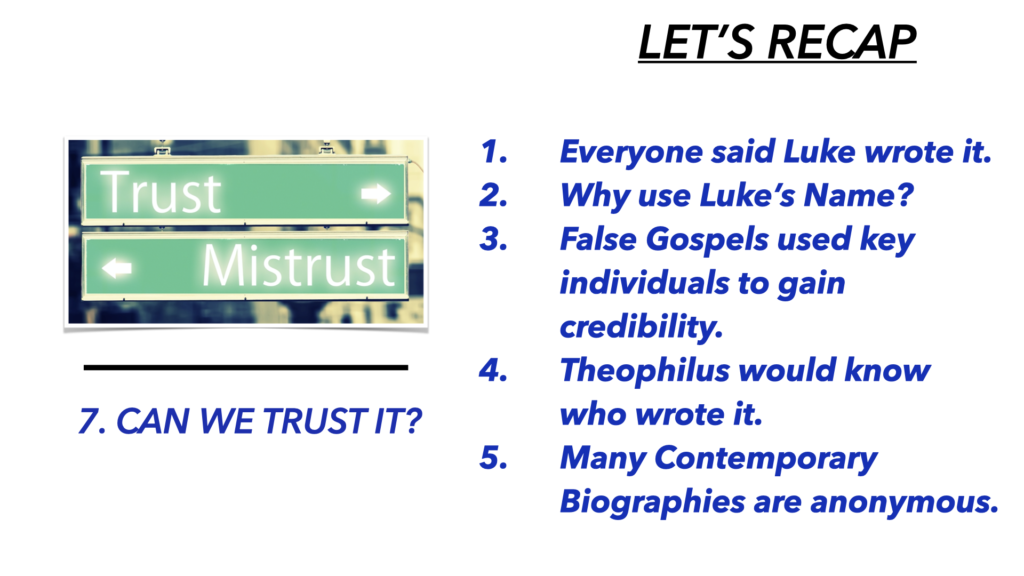 In our next post in this Gospel of Luke Series, we will go through verses 1-4. And we’re going to continue to return to these seven pillars.
In our next post in this Gospel of Luke Series, we will go through verses 1-4. And we’re going to continue to return to these seven pillars.
I hope this post was a blessing to you. If you prefer watching, below is the livestream.
Introduction To Luke’s Gospel
Please share your thoughts in the comments section below.
Ps. Thank you to my monthly partners who help make things like this a reality. And thank you to Mr Chau for spending time editing this article for you.
References
| ↑1 | Anti-Marcionite Prologue |
|---|---|
| ↑2 | Muratorian Canon |
| ↑3 | Irenaeus. Against Heresies. Book III. Chapter 14 |
| ↑4 | Tertulian. Against Marcion. Book IV |
| ↑5 | Peter J Williams. Can We Trust The Gospels |
| ↑6 | Didache. Ch 4. 13 |
| ↑7 | Dialogue With Trypho. Ch 100. 103 |
| ↑8 | Dr R. J. Knowling. The Medical Language of St. Luke. II. The Biblical World Vol 20. No 5 (Nov 1902). 370-379 |
| ↑9 | Dr Donald Guthrie. New Testament Introduction. Page 114 |
























Recent Comments